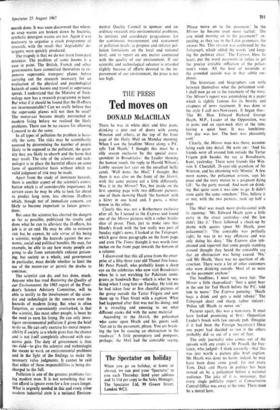Ted moves on
THE PRESS DONALD McLACHLAN
There he was in white shirt and blue jeans, drinking a pint out of doors with young Winston and others, at the top of the front page of the Daily Mail on Monday morning. When I saw the headline 'Move along, a P.C. tells Ted Heath.' I thought this must be a silly season exclusive by the special corre- spondent in Broadstairs: the Leader showing the human touch, the reply to Harold Wilson's Lobby session last year on the unsullied Scilly sands. 'Well done, the Mail,' I thought. But there it was also on the front of the Sketch, with the same picture cut a little differently. Was it in the Mirror? Yes, but inside on the first opening page with two different pictures, one of them showing Heath 'the barman' with a bitter in one hand and, I guess, a bitter lemon in the other.
Clearly this was not a Rothermere exclusive after all. So I turned to the Express and found one of the Mirror pictures with a rather briefer slice of prose. Then, just to make sure that Heath's brush with the law really was part of Sunday night's news, I looked at the Telegraph, which gave three paragraphs on the front page, and even The Times thought it was worth four inches on the front page towards the bottom of a column.
I discovered that this all arose from the enter- prise of a fifty-three year old Thanet free-lance. Mr Peter Powell, who probably keeps a sharp eye on the celebrities who now visit Broadstairs when he is not watching for Pakistani immi- grants.in Sandwich Bay—which is what he was doing when I rang him on Tuesday. He told me he had taken four or five cheerful pictures of the group outside the Tartar Frigate and sent them up to Fleet Street with a caption. What had happened after that was not his doing: and it is revealing and amusing to see what different cooks did with the same material.
According to the Sketch, the policeman who came upon Heath and his guests said, 'Get on to the pavement, please. You are break- ing the law by causing an obstruction in the roadway.' A little peremptory and pompous, perhaps; the Mail had the constable saying. 'Please move on to the pavement.' In the Mirror he became even more tactful: 'Do
you mind moving on to the pavement?' ex- pecting, as they say in the 1.atin grammars, the answer No. This version was confirmed by the
Telegraph, which added the words 'and keep- ing the pathway clear.' The Express, bless its heart, put the word pavement in italics to get
the precise irritable inflection of the police- man's voice. All the heat of noontide at the crowded seaside was in that subtle em- phasis.
The historians and biographers can settle between themselves what the policeman said : 1 shall now go on to the treatment of the story. The Mirror's report was astonishing in a paper which is rightly famous for its brevity and crispness of news treatment. It was done in the style I call neo-Newsweek. It began thus: 'The Rt. Hon. Edward Richard George
Heath, M.P., Leader of the Opposition, was in jeans and an open-neck shirt at the time,
having a quiet beer. It was lunchtime. The day was hot. The beer was pleasantly cool.'
Clearly, the Mirror man was there, accumu-
lating each tiny detail. He went on : 'And his friends were all around him outside the Tartar Frigate pub besides the sea at Broadstairs, Kent, yesterday. There were friends like Win- ston S. Churchill, 26-year-old grandson of Sir Winston, and his charming wife Minnie.' A few more names, the policeman arrives, says his piece and the story moves to a poignant dying
fall: 'So the party moved. And went on drink- ing. But quite soon it was time to go. It didn't seem quite the same somehow.' This, believe it or not, With the two pictures, took up half a page.
The Mail was much more professional with its opening: `Mr. Edward Heath gave a little
party in the street yesterday—and the law didn't like it.' There followed a check-up by phone with quotes (poor Mr Heath, poor policeman!): 'The constable was perfectly
right; he was in no way offensive and was only doing his duty.' The Express also tele-
phoned and reported that some people standing around thought they heard the constable say that an obstruction was being caused. 'No,'
said Mr Heath, 'there was no question of ob- struction. There were a lot of other customers who were drinking outside. Most of us were on the pavement anyhow.'
The headlines, I must say, were fair. The Mirror a little rhapsodical: 'Just a quiet beer in the sun for Ted Heath before the P.C. told him to move.' The Express punning: 'Heath buys a drink and gets a mild rebuke.' The Telegraph short and sharp, rather sinister: 'Police tell Heath to move on.'
Pictures apart, this was a non-story. It must have looked promising at first : Opposition Leader's brush with law outside pub. (Imagine if it had been the Foreign Secretary.) Once one paper had decided to run it the others probably did so out of a sort of fear.
The only journalist who comes out of the episode with any credit is Mr Powell, the free- lance, who judged—I think torrectly—that this was just worth a picture plus brief caption. Mr Heath was done no harm: indeed, he may
have been done some good; for not every
Tom, Dick and Harry in politics has been moved on by a policeman before a national audience. The joke of it is, moreover, that every single publicity expert at Conservative Central Office was away at the time. There must be a moral here.






























 Previous page
Previous page